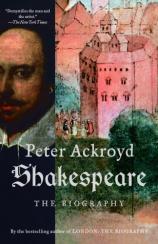Shakespeare: The Biography
Review
Shakespeare: The Biography
Writing about the life of William Shakespeare is a bit like trying
to catch an echo with your hands. Public records verify the
existence of a William Shakespeare who was born and raised in
Stratford and then became a resident of London. However, there is
no direct proof that this man, the son of a modestly affluent
glover, was responsible for the plays and poems that have
immortalized his name. In spite of, or perhaps because of, this
uncertainty, Shakespearean biography has proved a fertile scholarly
enterprise since the publication of Edward Dowden's 1875 book,
SHAKESPEARE: A CRITICAL STUDY OF HIS MIND AND ART. Among the
thousands of biographies that have ensued, two groundbreaking
analytical studies, released in recent years by Stephen Greenblatt
and Margery Garber, raise the question of authorship. (Christopher
Marlowe, Francis Bacon and the Earl of Oxford de Vere are among
those suggested as possible authors for this substantial body of
work.) Peter Ackroyd's SHAKESPEARE: A BIOGRAPHY appears, then, at a
time when matters of attribution are a source of contention.
Well-known for his spirited biographies of Sir Thomas More, Blake,
Dickens and T. S. Eliot, Ackroyd assumes that the Shakespeare of
public record is indeed the man who wrote the plays and poems. This
approach is neither naïve nor uninformative; his aim
throughout is to illustrate how the works themselves illuminate the
writer's lived experience as a confident, enterprising man of his
day. Thus, the book jacket accurately boasts, "[Ackroyd's] method
is to position the playwright in the context of his world,
exploring everything from Stratford's humble town to its fields of
wildflowers; discerning influences on the plays from unexpected
quarters; and entering London with the playwright as modern
theatre, as we know it, is just beginning to emerge."
One of SHAKESPEARE's many virtues is its consideration of the rich
and varied contexts of village and city life in sixteenth-century
England. We learn, for example, that the flora and fauna of
Stratford-upon-Avon (a street along the river) is conversant with
the extensive references to weeds and wildflowers in Shakespeare's
plays; his lifelong proximity to water made him especially
attentive to its tides and occasional floods --- images also
prevalent in his work; and his father's trade as a glover probably
informed the writer's intimate and complex metaphors about
gloves.
This approach is interesting in itself. But Ackroyd further
suggests that the playwright's social, cultural and religious views
were symptomatic of his time. If the preservation of Shakespeare's
childhood home reveals a situation that allowed little privacy,
this indicates the lack of privacy afforded to most people of that
time; if Shakespeare's father occasionally violated a strict
regulation in village law and was fined, his struggle to balance
individual expression with social responsibility was a challenge
for others, too; and if Shakespeare's ambiguous sexuality is
suggested strongly in plays and sonnets, this reveals a world in
which labels regarding sexual identity were not as fixed as they
are today. In short, the history of one man becomes a history of a
nation --- and an age.
Handsomely printed and carefully constructed from a staggering
breadth of sources, SHAKESPEARE is an effective synthesis of
first-hand observations and astute paraphrase. Whereas Ackroyd is
clearly conversant with Shakespeare's work, he is comparatively
less intimate with primary source documents. Almost nowhere does he
cite original public records but instead relies on the
well-documented research of other scholars. This tendency should
not impair novices or armchair historians, but will prove
undoubtedly troublesome for scholars of this subject and period.
Occasionally, too, Ackroyd's language is disturbingly evasive.
Consider the following passage:
"The writer of the sonnets seems to have been touched by the fear
and horror of venereal disease, and some biographers have even
suggested that Shakespeare himself died from a related venereal
condition. Nothing in Shakespeare's life or character would exclude
the possibility."
As relevant as this point may be, Ackroyd does not indicate how
such fear and horror are evident in the sonnets; nor does he
provide a footnote for at least a partial list of biographers who
suggest the writer died of venereal disease. Finally, the last
sentence in the passage is at once tantalizing and aggravating ---
it hints more than it reveals.
Notwithstanding these complaints, SHAKESPEARE: A BIOGRAPHY is a
worthy addition to the mountain heap of other Shakespeare
biographies. Ackroyd's lively, elegant prose is wonderfully
readable, and his knowledge of the plays and poems is consistent
and illuminating. Anyone eager to get acquainted with the life of
Shakespeare and, by extension, with England as it straddled the end
of the middle ages and the dawn of the Renaissance, will find in
these pages a warm, trustworthy voice.
Reviewed by Tony Leuzzi on January 23, 2011
Shakespeare: The Biography
- Publication Date: November 14, 2006
- Genres: Biography, Nonfiction
- Paperback: 592 pages
- Publisher: Anchor
- ISBN-10: 9781400075980
- ISBN-13: 9781400075980




